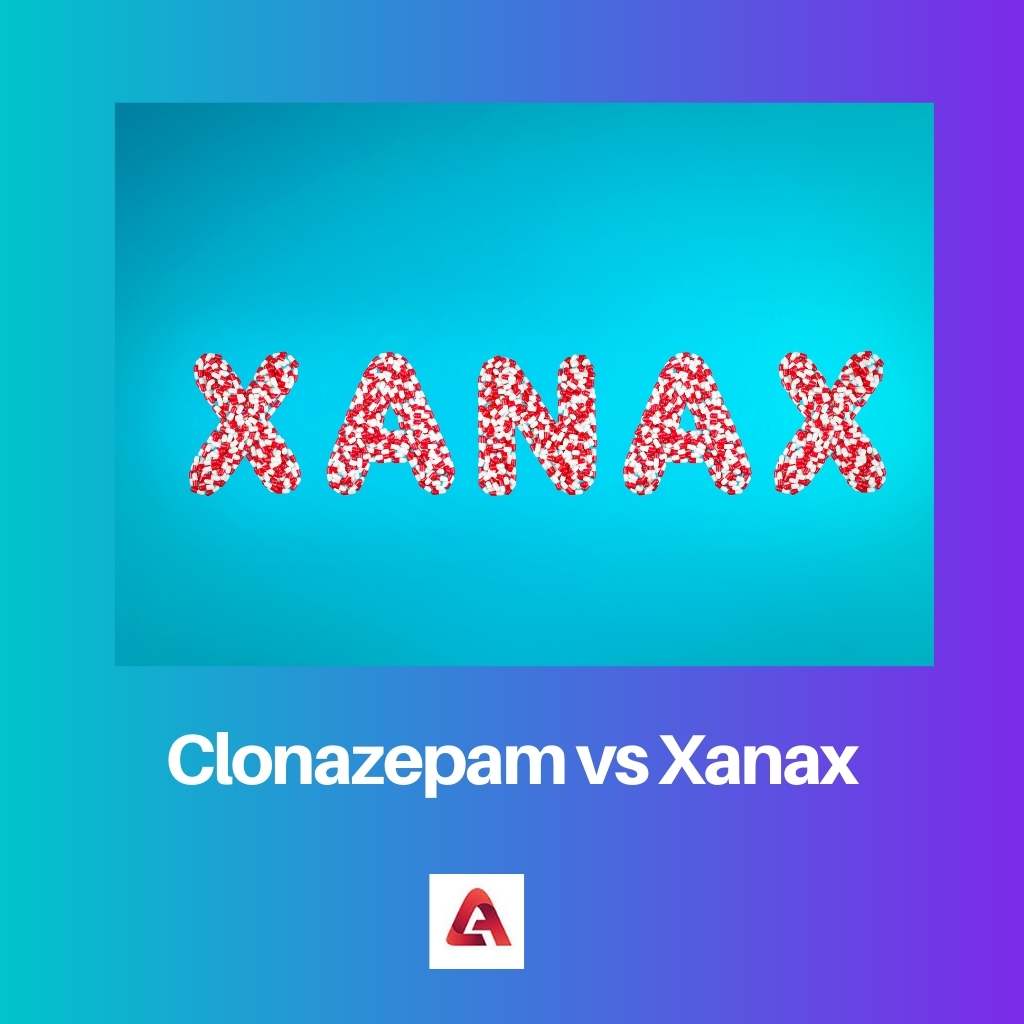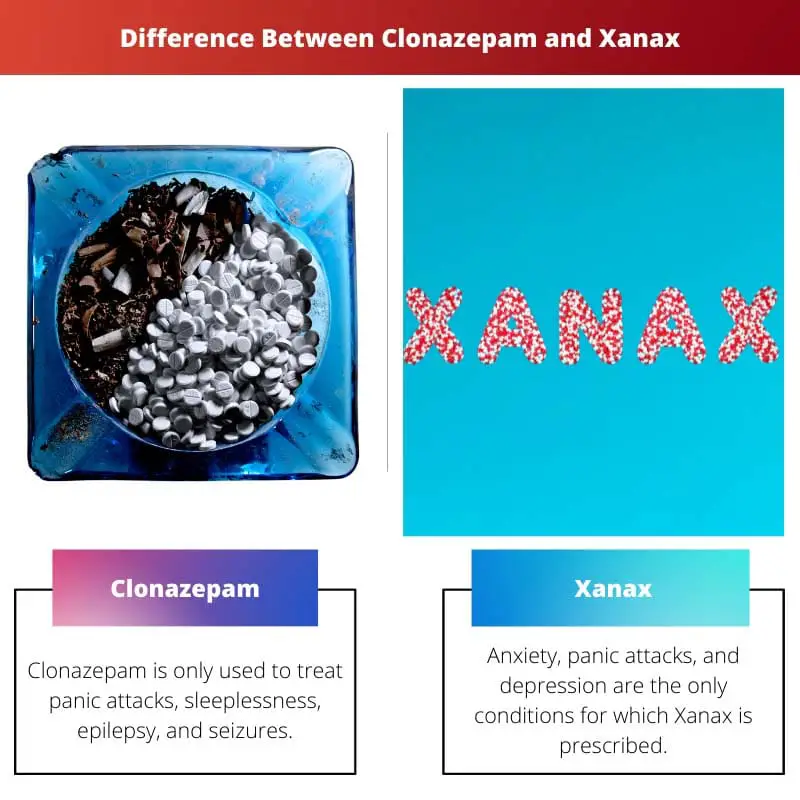Some types of drugs are famous for the treatment of various mental and psychological problems. However, they are highly addictive if not taken under strict regulations and supervision.
Clonazepam and Xanax are two common types of benzodiazepines strictly used for the treatment of mental disorders.
Key Takeaways
- Clonazepam is a long-acting benzodiazepine, while Xanax is a short-acting benzodiazepine.
- Clonazepam treats seizures and panic disorders, while Xanax primarily targets anxiety and panic disorders.
- Clonazepam has a slower onset and longer duration of action, while Xanax works quickly but has a shorter duration.
Clonazepam vs Xanax
Clonazepam is a medication that is used to prevent and treat panic disorders, seizures, anxiety disorders and akathisia. It is sold under the brand names of Klonopin and Rivotril. Xanax is the brand name for Alpazolam, and is a potent tranquilizer for treating acute symptoms of anxiety, panic attacks and depression.

Clonazepam is only used to treat panic attacks, sleeplessness, epilepsy, and seizures. Clonazepam should be taken in moderation; else, it could become too addictive for the individual taking it.
Clonazepam can cause muscle weakness, dizziness, weight gain, rashes on the skin, nausea, runny nose, loss of balance, drowsiness, and memory issues.
Anxiety, panic attacks, and depression are the only conditions for which Xanax is prescribed. However, it can only treat acute symptoms.
Sweating, nausea, stomach discomfort, loss of coordination and balance, sleeping issues, concentration problems, memory loss, headache, dizziness, and sleepiness are some of the side effects induced by Xanax.
Comparison Table
| Parameters of Comparison | Clonazepam | Xanax |
|---|---|---|
| Trade names | Klonopin | Trading name of “Alprazolam”. |
| Half-life | 18-50 hours | 11.2 hours-immediate release; 10.8 -15.9- extended release. |
| Intake | Sublingual, Intravenously, I.M., oral | Oral |
| Forms available | Dissolving Tablets, Tablets | Tablets only |
| Bioavailability | 90% | 80-90% |
What is Clonazepam?
Clonazepam is known as “Klonopin” in the United States. Clonazepam is only used to treat anxiety, sleeplessness, epilepsy, and seizures. Clonazepam should be taken in moderation; otherwise, the person who is taking it may become addicted to it.
Muscle weakness, dizziness, weight fluctuations, skin rashes, nausea, runny nose, loss of balance, drowsiness, and memory issues are some of the side effects induced by Clonazepam.
Clonazepam’s effects are only visible for 18 to 50 hours.
Clonazepam is only prescribed to persons who are allergic to benzodiazepines, have narrow-angle glaucoma, or have serious liver disorders. Clonazepam has a bioavailability of approximately 90%.
Clonazepam can be injected directly into the veins, inserted under the tongue, injected intramuscularly, or swallowed. Clonazepam is offered in two different forms: dissolving pills and simple tablets.

What is Xanax?
Alprazolam, also known as Xanax, is a prescription medication. Anxiety, panic attacks, and depression are the only illnesses for which Xanax is recommended.
It can only be used to treat acute symptoms. If not administered as a prescription according to regulatory guidelines, Xanax can become addictive.
Sweating, nausea, stomach trouble, loss of coordination and balance, sleeping issues, concentration problems, memory loss, headache, dizziness, and sleepiness are some side effects that Xanax can induce.
The immediate release of Xanax can take up to 11.2 hours, whereas the extended release can take anywhere between 10.8 and 15.9 hours.
Xanax should not be used by persons who are already taking Nizoral or Sporanox. On the other hand, those with narrow-angle glaucoma should avoid taking Xanax.
Xanax has an approximate bioavailability of 80% to 90%. Only through the mouth can Xanax be absorbed into the body. Only tablets of Xanax are available for purchase.

Main Differences Between Clonazepam and Xanax
- The name with which Clonazepam is traded is “Klonopin”. On the other hand, Xanax is the trading name of the drug, Alprazolam.
- Clonazepam is exclusively prescribed for disorders caused due to panic attacks, insomnia, epilepsy and seizures. On the other hand, Xanax is exclusively prescribed for disorders caused due to anxiety, panic attacks, and depression. However, it can cure acute symptoms only.
- Intake of Clonazepam should be regulated. Otherwise, it may be too addictive for the person who is taking it. On the other hand, the intake of Xanax can be addictive if not taken as a medicine according to regulatory norms.
- Some of the side effects caused due to Clonazepam includes muscle weakness, dizziness, changes in weight, rashes on the skin, nausea, runny nose, loss of balance, drowsiness, and problems related to memory. On the other hand, some of the side effects caused due to Xanax are sweatiness, nausea, stomach upset, loss of coordination and balance, sleeping problems, concentration problems, memory loss, headache, dizziness and drowsiness.
- Only up to 18 to 50 hours the effect of Clonazepam can be seen. On the other hand, the immediate release of Xanax takes up to 11.2 hours, and the extended-release can take up to 10.8 to 15.9 hours.
- The intake of Clonazepam is restricted to those people who are allergic to any benzodiazepines, possess narrow-angle glaucoma or possess severe diseases related to livers. On the other hand, people who are already on the consumption of Nizoral or Sporanox should not use Xanax. However, people suffering from narrow-angle glaucoma should also ignore using Xanax.
- The bioavailability of Clonazepam is around ninety per cent. On the other hand, the bioavailability of Xanax is around eighty to ninety per cent.
- Clonazepam can be taken directly into the veins, placed under the tongue, through I.M., or simply through the oral cavity. On the other hand, Xanax can be taken into the body only via the oral cavity.
- Clonazepam is available in two forms, either in form of dissolving tablets or in the form of simple tablets. On the other hand, Xanax is available in the form of tablets only.


I’m concerned about the addictive nature of these drugs. The article should have shed more light on this aspect.
The addictive potential definitely requires more emphasis.
This piece provides a thorough understanding of the key differences between Clonazepam and Xanax. Very well written and detailed.
Indeed, the article effectively highlights the distinctions.
It’s refreshing to find such detailed content.
The article provides a comprehensive comparison between Clonazepam and Xanax. However, the addictive nature of both drugs should have been discussed more.
It’s critical to emphasize the addictive risks associated with Clonazepam and Xanax.
Exactly, the addictive potential of these drugs is a significant concern.
I wish the article delved more into the long-term effects of Clonazepam and Xanax.
Agreed, the long-term impacts should also be presented.
Very informative piece. An eye-opening read.
The side effects highlighted for both drugs are concerning. Balanced information is provided in this article.
The article effectively presents both the positive and negative aspects of Clonazepam and Xanax.
Interesting article about Clonazepam and Xanax. It provides clear information about both drugs.
It’s surely informative and well explained.
The information provided in this article is thought-provoking. It’s important to be aware of the potential side effects and differences between Clonazepam and Xanax.
Absolutely, understanding the implications of such medications is crucial.